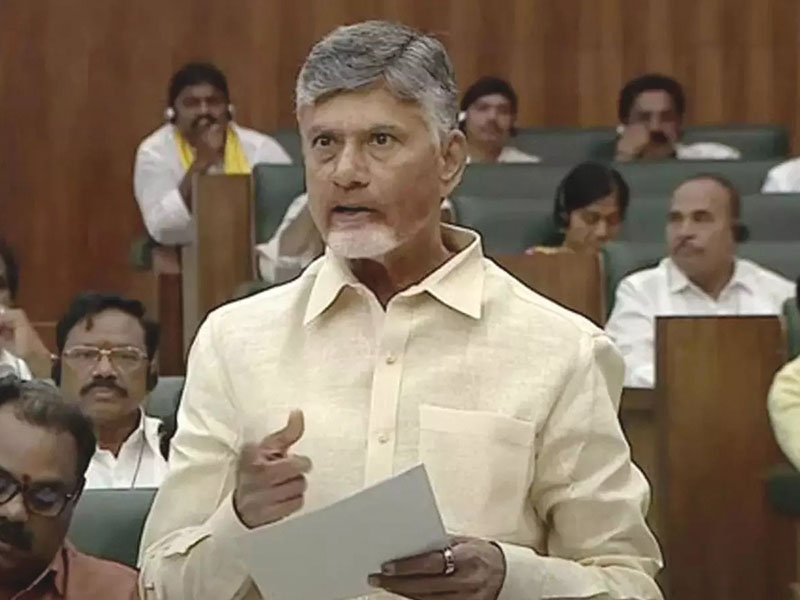Priyanka Edupuganti (Hyderabad)

AP chief minister Chandrababu Naidu
Talliki vandanam (‘salutations to mother’), a new scheme launched by Andhra Pradesh’s Telugu Desam Party (TDP) which was returned to power with an overwhelming majority in the legislative assembly election of 2024 to boost K-12 enrolments statewide, has provoked a major controversy.
Not only the opposition Congress party but several respected economists have raised red flags warning that the huge payout of Rs.9,407 crore for the scheme, which will be added to the state’s education budget of Rs.29,861 crore (out of a total budgeted expenditure of Rs.2,79,279 crore for 2025-26) will prove ruinous.
Under the Talliki Vandanam scheme, all children from EWS (economically weaker section) households with annual incomes of Rs.10,000 (rural) and Rs.15,000 (urban) — and/or land, buildings and consumer durables below specified limits — enrolled in K-12 classes of recognised schools, are entitled to a cash subsidy of Rs.15,000 per year. The state government will pay the amount into the bank account of their mothers who will be required to pay school managements Rs.13,000 towards fees and Rs.2,000 for institutional infrastructure maintenance. The refreshing departure from normative practice is that all children — whether in government or private schools and junior colleges — from EWS households, are entitled to this subsidy. The subsidy amount payable from the start of the current academic year 2025-26 to an estimated 4.3 million mothers will benefit an estimated 6.7 million children statewide.
“No matter how many children a family has, all studying from class I to Intermediate (class 12) will be covered under this scheme. The goal is to make school education better, give equal chance to all students, and help them learn more. The scheme also wants mothers to play a bigger role in their children’s education journey,” said a senior official of the TDP government who added that this “mother of all welfare schemes” will motivate families to have more children to address falling birth rates and manage future population needs, according to an India Today online report (June 18).
However, some informed economists have criticised the scheme as being driven by “reckless populism” disguised as a programme to promote children’s education. “There’s no guarantee that usually illiterate EWS mothers have sufficient agency to spend Talliki Vandanam allocations for the intended purpose. On the contrary, this populist giveaway scheme may generate household discord and prove impossible to administer. It seems to have been inspired by the expensive giveaway schemes — free bus rides for women, rations and electricity — in neighbouring Karnataka, which has ruined the fiscal stability of the state,” says a professor of education at the Stella Maris College, Vijayawada who prefers to remain anonymous.
There is some substance in this apprehension. According to the AP Socio-Economic Survey for 2024-25, Andhra Pradesh is experiencing “tremendous financial stress due to shrinking of revenue base, bludgeoning (sic) expenses, increase in establishment costs, interest payments, welfare commitments and loss of capital city as a major commercial hub” — the latter a reference to the loss of Hyderabad as a shared capital after the city of pearls accrued to Telangana as its admin capital in 2024, following the division of united Andhra Pradesh into two separate states in 2014. Moreover, according to a 2024 Reserve Bank of India report, AP is among the most fiscally fragile states in India with its debt-GSDP ratio exceeding 32 percent (cf. the recommended 25 percent) and its 2025-26 fiscal deficit budgeted at 4.9 percent of GSDP (gross state domestic product).
However, it is important to note that TDP leader Chandrababu Naidu is not responsible for the current fiscal distress of Andhra Pradesh. The state’s economic fragility is largely a result of unchecked debt accumulation, unproductive expenditure, and fiscal mismanagement under the previous YSR Congress Party government led by Y.S. Jagan Mohan Reddy. The Naidu government has inherited these liabilities and is now tasked with stabilising the economy. That said, Naidu’s earlier terms as chief minister are widely acknowledged for disciplined fiscal management, visionary infrastructure planning, and reforms in digital governance.
Despite the challenging financial environment, the Chandrababu Naidu-led government has not only revived two massive development projects — Amaravati (the greenfield capital city) and Polavaram (a critical irrigation and drinking water lifeline) — but has also introduced Talliki Vandanam.
Most academics in AP have welcomed Naidu’s renewed focus on critically important inclusive K-12 education for EWS households. The consensus is that given his can-do track record in previous terms as chief minister, there are high chances of Talliki Vandanam attaining its laudable objectives.
Also Read: Andhra Pradesh mandates schools to provide three student water breaks























